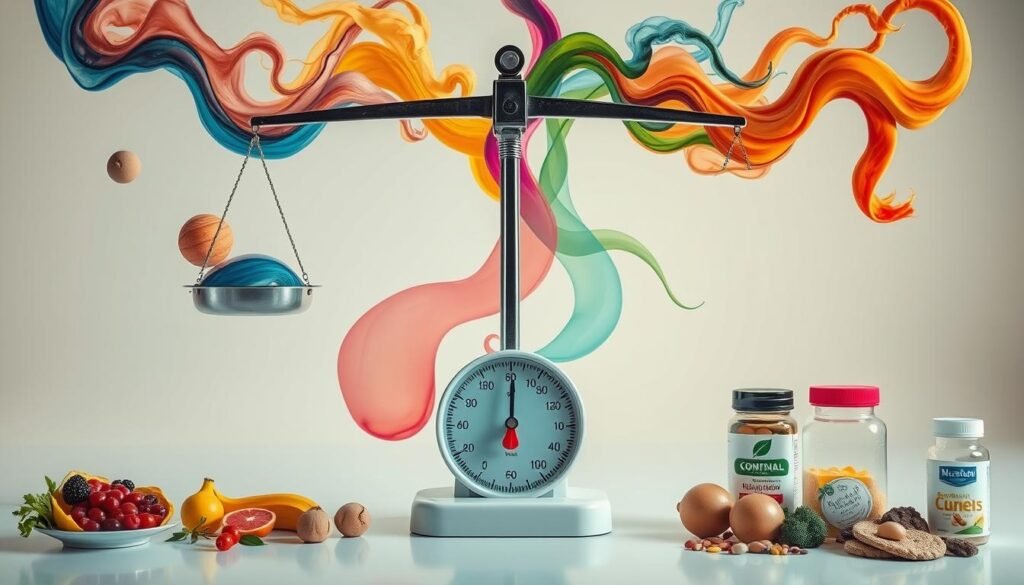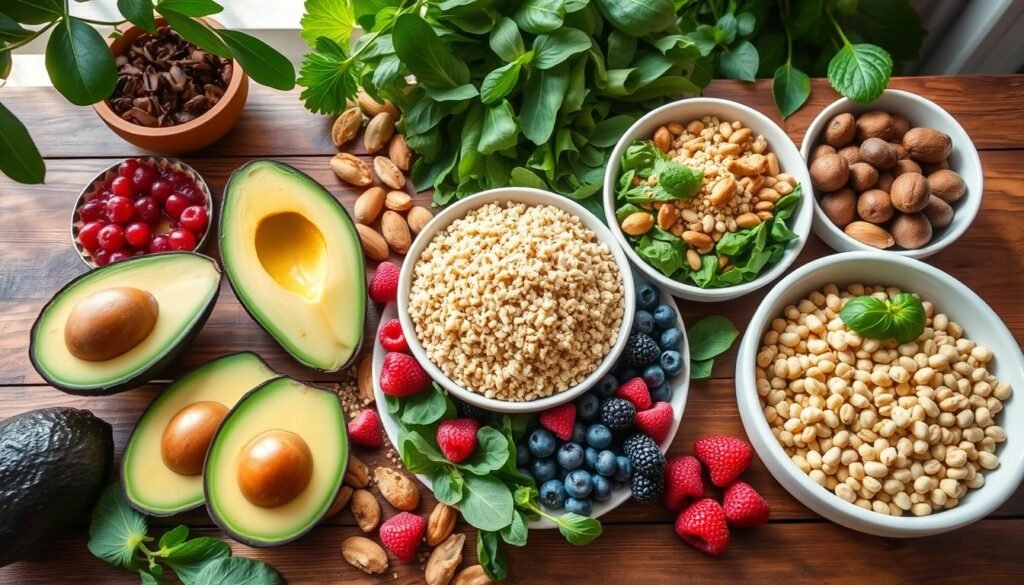Postpartum Weight Loss: Best Metabolism Booster Foods and Supplements
About 75 percent of women gain weight after having a baby, with many gaining 10 to 20 pounds. This is based on a 2015 study. Hormonal changes and metabolism are key factors in losing this weight. It’s important to understand how to manage these changes for successful weight loss.
Women are advised to gain 25 to 35 pounds during pregnancy. But, nearly half of them gain more. Breastfeeding can help with Weight Loss, but some weight gain is normal in the first 3 months. Losing 1.1 pounds a week is safe for breastfeeding moms. Eating right and using metabolism boosters can aid in this process.
==> Watch the Purple Peel Exploit Now And Turbocharge Your Calorie Burn

diet, hydration, and exercise are important for losing weight after having a baby. Eating whole foods, lean proteins, and healthy fats helps with hormone and metabolism balance. More fiber and protein can also Boost Metabolism. Drinking lots of water is key for recovery and hormone balance.
Key Takeaways
- A healthy diet that includes Metabolism Booster foods and supplements is essential for postpartum Weight Loss.
- Hormonal changes and metabolism are closely linked, and hormone regulation is critical for a healthy metabolism.
- Breastfeeding can aid in weight loss, but some weight gain is normal in the first 3 months.
- More fiber and protein can help boost metabolism and support weight loss.
- Drinking plenty of water is vital for recovery and hormone balance.
- A safe weight loss for breastfeeding women is about 1.1 pounds per week, and a healthy diet and lifestyle can help support this process.
Understanding Hormonal Changes After Birth
After giving birth, a woman’s body goes through big hormonal changes. These changes can mess with her endocrine system and health. They can also affect her metabolic rate and weight loss plans. It’s key to know how hormones play a part in recovery and how they change metabolic rate and energy use.
The postpartum period brings big changes in estrogen and progesterone levels. These changes can mess with mood, energy, and overall health. For instance, the drop in estrogen can cause mood swings, tiredness, and trouble sleeping.
The Role of Hormones in Postpartum Recovery
Hormones are very important in postpartum recovery. Knowing how they work can help women get through this tough time. Some important hormones include:
- Estrogen: controls mood and energy
- Progesterone: helps with milk and uterine recovery
- Insulin: controls blood sugar and metabolic rate
How Hormones Affect Metabolism
Hormonal changes after birth can really affect metabolic rate and weight loss. For example, prolactin, which helps with milk, can also make you hungrier. Also, the drop in estrogen can slow down metabolic rate, making it harder to lose weight.

Knowing about these hormonal changes and their effects on metabolic rate and health is key. It helps women find good Ways to lose weight and recover after birth. By focusing on hormonal balance and supporting their endocrine system, women can get better health and well-being during this important time.
| Hormone | Effect on Metabolism |
|---|---|
| Estrogen | Regulates mood and energy levels, affects metabolic rate |
| Progesterone | Helps with milk production and uterine recovery, affects metabolic rate |
| Insulin | Affects blood sugar levels and metabolic rate |
The Link Between Hormonal Changes and Metabolism
Hormonal changes are key in controlling how fast we burn calories and use energy. Hormones like those from the thyroid and insulin play big roles. When these hormones are in balance, losing weight becomes easier.
How Hormones Regulate Metabolic Rate
Insulin and estrogen are important for managing how we use energy. Insulin helps glucose get into cells for energy. Thyroid hormones, on the other hand, control how fast we burn energy.
Impact of Stress Hormones on Weight Loss
Stress hormones, like cortisol, can make losing weight harder. High levels of cortisol can cause more fat to be stored around the belly. Stress hormones can also mess with insulin and thyroid levels, making it tough to lose weight.

It’s important to understand how hormones affect our metabolism. Knowing about hormone levels, thyroid function, and insulin sensitivity helps us support our metabolic health. This knowledge can help us reach our weight loss goals.
| Hormone | Function |
|---|---|
| Insulin | Regulates glucose metabolism and energy production |
| Estrogen | Helps regulate metabolic rate and energy expenditure |
| Thyroid hormones | Regulate overall metabolic rate and energy production |
| Cortisol | Affects fat storage and metabolism, particularlly in response to stress |
Essential Nutrients for Postpartum Health
After having a baby, a mother’s body changes a lot. Eating well is key for recovery and losing weight. A hormonal imbalance can slow down body metabolism, making it hard to shed pounds. Important vitamins like vitamin D and iron help with energy and metabolic rate.
A diet full of protein, healthy fats, and carbs is good for metabolic rate and burning energy. Here are some vital nutrients for new moms:
- Iron: found in red meat, liver, clams, oysters, and green leafy vegetables
- Vitamin B12: found in animal foods like clams, tuna, liver, beef, and salmon, as well as in fortified dairy and cereals
- DHA: an omega-3 fatty acid found in salmon, sardines, fortified eggs, and dairy
- Choline: found in eggs and organ meats like liver
- Vitamin D: found in fatty fish like salmon and tuna, liver, fortified dairy and orange juice, as well as egg yolks
These nutrients are critical for body metabolism and health. A good metabolic rate aids in weight loss and health. New moms can support their body metabolism and health by eating these nutrients.

| Nutrient | Food Sources | Importance |
|---|---|---|
| Iron | Red meat, liver, clams, oysters, green leafy vegetables | Energy production and metabolic function |
| Vitamin B12 | Animal foods like clams, tuna, liver, beef, and salmon, as well as in fortified dairy and cereals | Proper red blood cell development and energy production |
| DHA | Salmon, sardines, fortified eggs, and dairy | Brain and vision development in infants |
Best Foods to Boost Your Metabolism
What you eat greatly affects your metabolism. Eating whole foods helps regulate hormones and metabolism. Foods rich in nutrients support the endocrine system, which controls many body functions.
Lean proteins, healthy fats, and complex carbs are great for your metabolism. They can help you lose weight and stay healthy. For instance, protein can boost your metabolic rate by 15–30%, while carbs and fats have less effect.
Other foods that boost metabolism include:
- Seaweed, rich in iodine, which is key for thyroid hormones and metabolism
- MCT oil, which raises metabolic rate and may not turn into fat as easily
- Ginger, known for its thermogenic effect and hunger reduction

Eating these foods can improve your health and metabolism. Don’t forget to drink lots of water. It helps your metabolism and aids in weight loss.
| Food | Metabolic Boost |
|---|---|
| Protein-rich foods | 15-30% |
| Seaweed | Supports thyroid hormone production |
| MCT oil | Increases metabolic rate |
The Role of Hydration in Metabolism
Drinking enough water is key for a healthy metabolism. It helps control hormone levels and boosts energy. Water makes up about 60% of our bodies and is vital for digestion, circulation, and keeping our body temperature right.
Studies show that drinking water can increase your metabolic rate and help with weight loss. For instance, a study showed that people who drank two glasses of water before eating ate 22% less than those who didn’t. Also, a study in the Journal of the American College of Nutrition found that even a little dehydration can hurt our brain function.
Here are some tips for staying hydrated:
- Drink at least eight glasses of water per day
- Include water-rich foods in your diet, such as fruits and vegetables
- Avoid sugary drinks and caffeine, which can dehydrate the body
Chronic dehydration can cause serious health issues. It can raise cortisol levels, affecting metabolism, mood, and reproductive health. The Women’s Health Group in Chicago, Illinois, suggests drinking plenty of water and eating a balanced diet for good health.

By focusing on hydration, we can keep our metabolism healthy. This supports our overall health and well-being. It helps regulate hormones, boosts energy, and keeps our weight in check.
| Food | Water Content |
|---|---|
| Fat-free milk, cantaloupe, strawberries | 90-99% |
| Fruit juice, yogurt, apples | 80-89% |
| Bananas, avocados, cottage cheese | 70-79% |
Supplements That Support Postpartum Weight Loss
Many new moms find it hard to lose weight after giving birth. Hormonal changes and increased nutrient needs during lactation make it tough. Supplements can help by boosting metabolic function and aiding in weight loss.
Protein powder is key for keeping muscle mass. This helps increase metabolic rate. Vitamin D supplements can also help address deficiencies and support health.
When picking supplements, think about how they affect insulin sensitivity and hormonal balance. Avoid those with too much caffeine or synthetic stimulants. They can harm breastfeeding babies. Instead, choose supplements with zinc, chromium, and alpha-lipoic acid for better metabolism and health.
Some good Supplements for postpartum weight loss are:
- Milk Dust Lactation Protein Powder
- Milk Dust Metabolism supplement
- Probiotics to support gut health
Always talk to a healthcare provider before starting any supplements, if you’re breastfeeding. The right supplements, along with a healthy diet and more exercise, can help new moms lose weight and stay healthy.

Exercise and Energy Expenditure
Regular exercise is key for losing weight after having a baby and keeping your metabolism going. The best exercises for this include aerobic activities, strength training, and high-intensity interval training. These exercises help with hormone regulation and body metabolism, which are vital for your health.
Moving more in your daily life can be as simple as walking or using the stairs. This boosts your energy use and aids your endocrine system. Also, exercises that build muscle and strength can raise your metabolism and improve your health.

- Improved hormone regulation
- Increased energy expenditure
- Enhanced body metabolism
- Support for the endocrine system
| Exercise Type | Benefits |
|---|---|
| Aerobic Exercise | improves cardiovascular health, increases energy expenditure |
| Strength Training | Builds muscle, boosts metabolism |
| High-Intensity Interval Training | Improves insulin sensitivity, increases energy expenditure |
Managing Stress for Better Metabolism
Stress can really affect our metabolism, hormone levels, and thyroid function. It can lead to weight gain and other health problems. Chronic stress can make us crave unhealthy foods and increase cortisol levels, causing more weight gain.
But, there are Ways to reduce stress and help our metabolism. Mindfulness practices like meditation and deep breathing can calm our minds and lower heart rate. Regular exercise, like walking or dancing, can also lower blood pressure and stress hormone levels.
Benefits of Mindfulness Practices
Mindfulness can help us eat better and avoid weight gain. It encourages us to eat slowly and make better food choices. It also helps lower cortisol levels, which can slow down calorie burning.
By adding mindfulness to our daily lives, we can manage stress better. This promotes overall well-being.

Techniques for Reducing Stress
- Practicing work-life balance
- Participating in fun activities or hobbies
- Maintaining good sleep hygiene
- Engaging in regular exercise, such as aerobic activities
- Trying relaxation techniques, such as mindfulness, meditation, and deep breathing
Managing stress and promoting well-being can help our metabolism and hormone levels. This leads to a healthier and more balanced life.
Creating a Sustainable Postpartum Diet
A sustainable postpartum diet is key for hormone regulation and body metabolism. It gives the endocrine system the nutrients it needs to work right. This is vital for health and losing weight. New moms often struggle to make a good diet because of caring for a baby and recovering themselves.
Meal planning is a smart way to keep a diet going. Here are some tips for new moms:
- Plan healthy meals and snacks in advance
- Incorporate whole foods, lean proteins, and healthy fats into your diet
- Stay hydrated by drinking plenty of water throughout the day
It’s also important to avoid yo-yo dieting. This means losing weight slowly, not quickly. By focusing on hormone regulation and body metabolism, new moms can make a diet that’s good for them in the long run.

Remember, a good postpartum diet is more than just losing weight. It’s about keeping the endocrine system healthy and feeling well. By following these tips and focusing on hormone regulation and body metabolism, new moms can make a diet that helps them recover and stay healthy.
The Importance of Sleep for Weight Loss
Sleep is key to keeping your metabolism healthy, which helps with weight loss. It helps control hunger and fullness hormones, like insulin. Not getting enough sleep can mess with these hormones, making it hard to lose weight.
Studies show sleep affects how well your body handles sugar and insulin. For instance, sleeping only 5 hours a night can lower insulin sensitivity by 20%. This can cause weight gain and raise the risk of type 2 diabetes.
To get better sleep and help with weight loss, set a regular sleep schedule. Try relaxing activities before bed, like reading or meditation. Also, avoid caffeine and screens before bedtime to sleep better.

- Go to bed and wake up at the same time every day
- Create a relaxing bedtime routine
- Avoid caffeine and electronic devices before bedtime
- Get regular exercise, but not before bedtime
By focusing on sleep, you can boost your insulin sensitivity and help with weight loss.
| Sleep Duration | Metabolic Rate | Weight Loss |
|---|---|---|
| 7-9 hours | Normal | Supported |
| 5-6 hours | Decreased | Challenged |
| Less than 5 hours | Significantly decreased | Difficult |
Consulting Professionals for Personalized Advice
As you keep working on losing weight after having a baby, getting help from health experts is key. Registered dietitians and health coaches offer advice made just for you. They help with hormone balance, metabolism, and the endocrine system.
When to See a Nutritionist
Seeing a nutritionist is a great idea after having a baby. They can make a meal plan that fits your needs. This plan helps with breastfeeding and getting back to your pre-pregnancy weight.
Nutritionists also know about supplements and how to fight fatigue and stress. They offer tips to help you feel better.
The Role of Health Coaches in Postpartum Care
Health coaches play a big role in helping new moms reach their wellness goals. They guide you on exercise, managing stress, and making lifestyle changes. This helps boost your metabolism and overall health.
By working with a nutritionist, health coach, or both, you get the support you need. They offer advice and help you stay on track. This way, you can reach your goals and live a healthy, balanced life.
FAQ
How do hormonal changes after birth affect my metabolism?
After childbirth, your body goes through big hormonal changes. These include shifts in estrogen, progesterone, and insulin levels. These changes can affect how fast you burn calories and how easy it is to lose weight.
What are the best foods to boost my Metabolism After having a baby?
Eating whole, nutrient-rich foods is key. Look for lean proteins, healthy fats, and complex carbs. Good choices include eggs, avocados, nuts, seeds, leafy greens, and whole grains.
Are there any supplements that can help me lose weight postpartum?
Some supplements might help, like protein powder, vitamin D, and omega-3s. But remember, they work best with a healthy diet and regular exercise. Always talk to a doctor before starting any supplements.
How does exercise impact my metabolism after giving birth?
Exercise is a big help. Mix up your routine with cardio, strength training, and HIIT. Start slow and build up your activity level as you get stronger.
How can managing stress help with postpartum weight loss?
Stress can slow down your metabolism and make it harder to lose weight. Try stress-reducing activities like mindfulness, meditation, or yoga. They can help balance your hormones and support your weight loss goals.
When should I consult a professional for personalized postpartum weight loss advice?
If you’re having trouble losing weight after having a baby, get help. A registered dietitian, nutritionist, or health coach can offer tailored advice and support.
